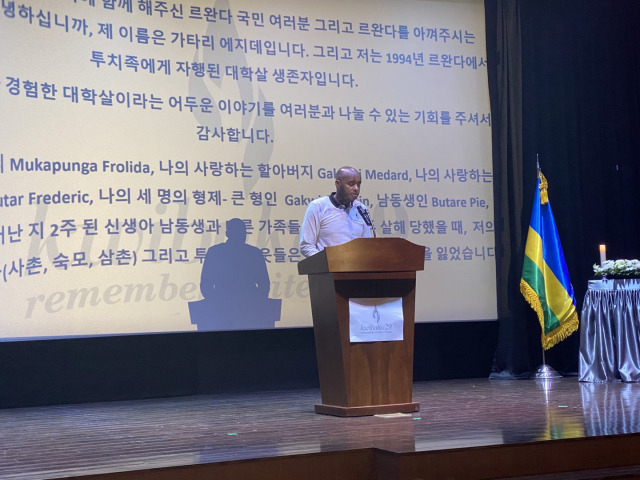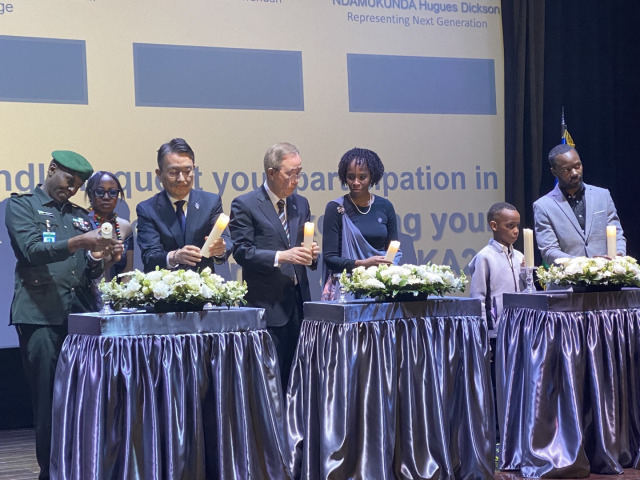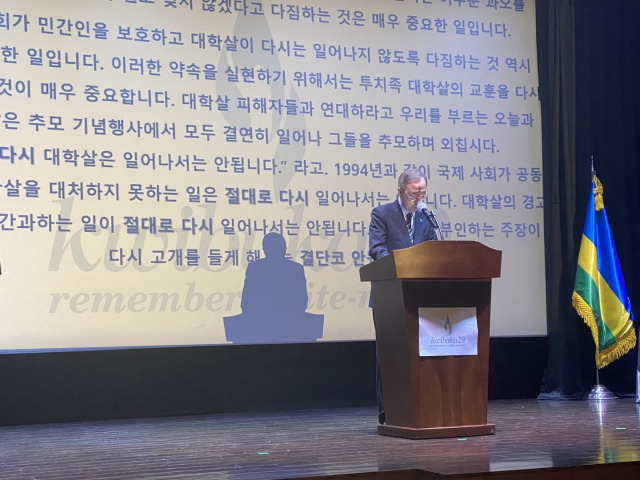 |
Egide Gatari, a survivor of the 1994 genocide against the Tutsi in Rwanda reads his testimony at the 29th anniversary of the genocide at the War Memorial of Korea in Seoul on Friday. (Sanjay Kumar/The Korea Herald) |
The Rwandan Embassy in Seoul marked the 29th anniversary of a genocide that killed more than one million people, mostly Tutsi and moderate Hutu, among others.
Tutsi and Hutus are ethnic groups from the African Great Lakes region.
The Great Lakes region encompasses Burundi, Rwanda, northeastern Congo, Uganda, and northwestern Kenya and Tanzania.
On April 7, the embassy gathered more than 200 people at the War Memorial of Korea to participate in Kwibuka29.
"Kwibuka" means to remember in Kinyarwanda, the official language of Rwanda.
More than one million people were estimated to have perished, and an estimated 150,000 to 250,000 women were raped during the genocide, according to the UN.
The Kwibuka29 commemoration began with a minute of silence in memory of the victims, followed by a testimony from Egide Gatari, one of the survivors of the genocide.
Gatari is currently studying at the KDI School of Public Policy and Management in Korea.
Gatari’s strong testimony highlighted the importance of remembering the past and taking responsibility to build a safer world for the next generation.
"As a country with similar experiences and foundations, Korea will work side-by-side with Rwanda and the world toward a better future by achieving what Kwibuka teaches us," said Park Yong-min, deputy foreign minister for multilateral and global affairs, in his remarks.
"I believe that not forgetting our darkest history and listening to the voices of the survivors is the beginning of making sure that it will never happen again," said Park.
 |
Guests prepare to light candles in remembrance of the victims of the 1994 genocide against the Tutsi in Rwanda at the War Memorial of Korea in Seoul on Friday. (Sanjay Kumar/The Korea Herald) |
Delivering remarks at the commemoration, Ban Ki-moon, the 8th secretary-general of the UN, highlighted the strong resilience of Rwandans over the past 29 years in overcoming the greatest of tragedies, inspiring the rest of the world.
"All nations and people never forget what occurred in the dark days of 1994," said Ban.
"Gatari, who also just made us very solemn and sad, I wish you the best of courage," Ban told Gatari, who was carefully listening to his remarks.
Ban also emphasized the importance of "never again," the UN's commitment after the 1994 Genocide against the Tutsi, and recognized the successful rebirth of Rwanda.
"This tragic event sadly taught us that a government can even get directly involved or fail to protect its civilians from genocide and mass atrocities (can occur) even under the watch of UN peacekeeping operations on the front," said Ban.
Ban called upon nations to fight for humanity, by ensuring perpetrators still at large are brought to justice.
"Let us never forget, and let us be emphatic and resolute to always declare: Never again," said Ban.
 |
Ban Ki-moon, the 8th secretary-general of the UN, delivers remarks at the 29th anniversary of the Rwandan genocide at the War Memorial of Korea in Seoul on Friday. (Sanjay Kumar/The Korea Herald) |
"Justice will prevail. If not today, tomorrow, if not tomorrow, surely in the future," Ban added, urging the international community to take lessons from the massacre.
Meanwhile, in sharing the history that led to genocide against the Tutsi and the need to fight hate speech and genocide ideology, Rwandan Ambassador to Korea Yasmin Amri Sued thanked attendees, especially Gatari, who showed the importance of Kwibuka, and the Rwandan and Korean youth who showed up.
She recalled the discrimination that Rwandan people suffered under Belgian colonial rule, which lasted several decades.
Rwanda was a colony of Belgium from 1919 to 1962.
"Korea knows well that colonial regimes rule by destroying national social structures, installing systematic decimation, and instituting national values, beliefs, and culture," said the ambassador.
The event was attended by a delegation from Rwanda, members of the diplomatic corps, officials from the Korean government, friends of Rwanda, members of the Rwandan community, reporters, professors, Korean students and businesspeople.







